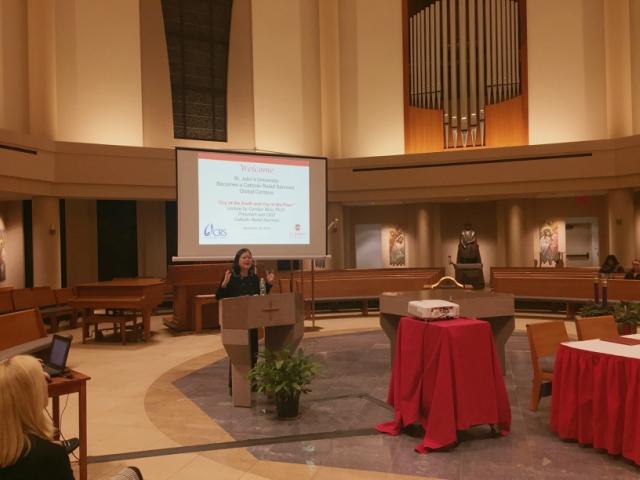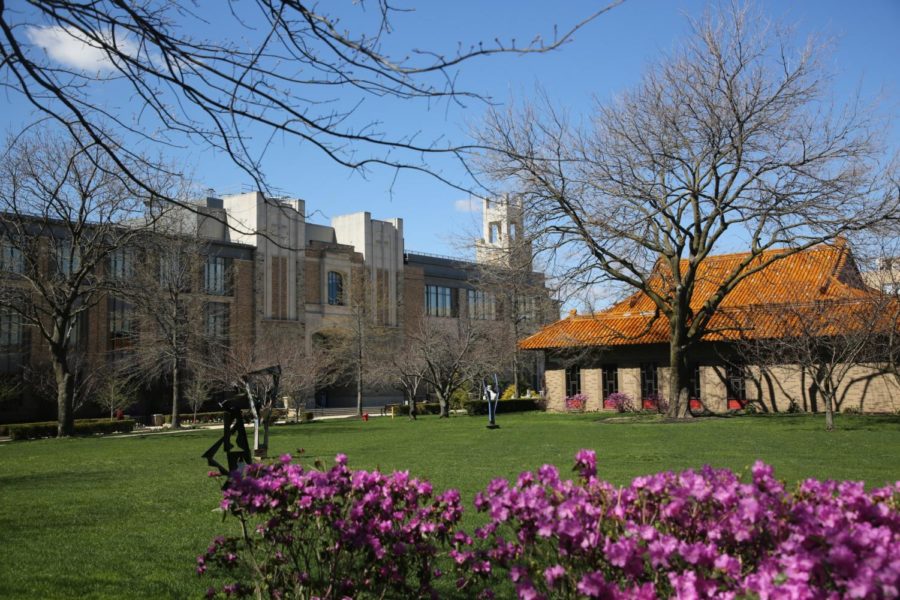On Nov. 28, Carolyn Woo, Ph.D. gave a lecture entitled “Cry of the Earth and Cry of the Poor” at St. Thomas More Church to an audience of over fifty members of the St. John’s community, including President Conrado “Bobby” Gempesaw.
The event, a part of the University’s Academic Lecture Series, marks the recognition of the University as one of ten CRS Global Campuses, solidifying its status as a campus that “promotes global solidarity through an institutional partnership with CRS,” according to CRS’ official website.
“Thank you for the work that you and CRS have accomplished. At SJU, we are very grateful for the partnership,” said Gempesaw following the lecture.
Catholic Relief Services (CRS) is the national humanitarian agency of the Catholic community, founded by American Catholic Bishops during World War II. Its mission is to “assist impoverished and disadvantaged people overseas, working in the spirit of Catholic social teaching to promote the sacredness of human life and the dignity of the human person,” according to its official website. The organization has an active chapter of campus ambassadors at the University, established in 2014.
“This type of relationship [between the University and CRS], we are involved at every level; student, faculty … It only happens because people work at it, people are passionate about it,” Woo said.
Alexandra Willard, sophomore and vice-president of the University’s CRS chapter, expressed why she thinks that this is a big step for St. John’s.
“Now the campus as a whole is affiliated with CRS, it’s not just our club, it’s the whole campus,” Willard said. “We feel like [CRS] is fully behind us now, they support us and they recognize everything we’re doing,”
Woo, who is president and CEO of Catholic Relief Services (CRS), served from 1997-2011 as dean of the University of Notre Dame’s Mendoza College of Education. She began her work at CRS in 2004, serving on its board of directors until 2012. She was recently listed among Foreign Policy Magazine’s 500 most powerful people on the planet in 2013.
Woo began the lecture by speaking about CRS’ mission and its worldwide operations, noting that it has helped those in nations such as Afghanistan, Greece, Myanmar and Iraq.
“We work at individual, family, community levels. We try to build up their assets, healthcare, and financial capital,” Woo said, adding that every community’s situation calls for a unique approach in aid.
Woo covered two main issues in relation to poor communities: refugees and climate change.
To introduce each topic, Woo screened two short CRS-produced videos. She spoke about the importance of providing homes for refugees, emphasizing that half of the 65 million currently displaced people are children.
“If we handle this problem well, we will have the largest generation of peacebuilders,” Woo said. “If we just write them off, we will have the largest generation of displaced people.”
Woo said that while many are under the impression that educating these displaced children is not a priority, education is as important as providing shelter, food and water.
Woo then discussed the adverse effects of climate change, stating that those who suffer the most from changed weather patterns and dying crops are poor and vulnerable communities.
“In CRS, we have no debates about climate change, because we encounter it,” Woo said. “The cry of the earth and poor are generated by the same thing – human action.”
Matthew Callaghan, sophomore and business major, spoke about the impact Woo’s presentation had on him.
“I’ve been studying a lot of Catholic social teaching, and trying to get a better understanding of how we can see that in action actually in the real world,” Callaghan said.
He continued, “Catholic Relief Services is an organization that lives that out in its mission, and I liked being able to see how they achieve that and how they go about systemic justice instead of just treating the need.”














